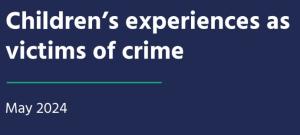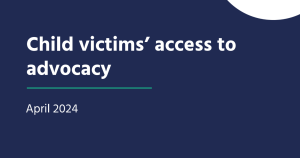I conducted my first project on strip searching because I was shocked and appalled by what happened to Child Q in Hackney last year. I felt that I owed it to her to establish whether she was the only child this has happened to. She wasn’t.
Those findings, published last August in relation to the Metropolitan Police, were deeply concerning. They revealed that there were systemic problems with transparency, scrutiny and non-compliance with guidelines when children were being strip searched under stop and search powers.
I am now releasing further never-before-published analysis of strip searches of children conducted by police under their stop and search powers across England and Wales. What this shows is that this is not an isolated problem, limited to London. Across England and Wales, police are strip searching children as part of stop and searches and there is evidence of deeply concerning practice.
My findings include evidence of widespread non-compliance with the statutory safeguards in place to protect children, including the lack of Appropriate Adults in more than half of searches and strip searches being conducted in schools, police vehicles, and within public view.
I have serious concerns about the poor quality of record-keeping, which makes transparency and scrutiny very difficult, and means that the numbers in this report may only be a minimum. Further, I find it utterly unacceptable that Black children are up to six times more likely to be strip searched when compared to national population figures.
I have talked to senior police officers, who have explained to me why it is sometimes necessary to strip search children for their own safety. I accept in certain, limited situations this may be necessary.
My challenge in response is that if this intrusive and potentially traumatic power is necessary, then there must be robust safeguards. The additional complexity of conducting these searches during astop and search should mean that there is a higher degree of scrutiny than if conducted in custody, not less. I do not see a working system of safeguards.
I see a fundamentally reactive and permissive system that places too much reliance on non-specialist frontline officers always doing the right thing, with no system of scrutiny to ensure that vital safeguards are being met, and little consideration of the impact of a potentially traumatic power on vulnerable children. It bears repeating that there is sustained attention on this issue not because of a police whistle-blower or a damning inspection report, but the bravery of a girl to speak up about a traumatic thing that happened to her.
Further work is needed to strengthen the guidelines around strip searches, for there to be oversight and inspection to ensure compliance, and reform of a culture that has allowed this to go unchallenged. I find it completely unacceptable that police forces in England and Wales are largely unable to account for the necessity, circumstance and safeguarding outcome of every strip search of a child that they conduct. I will not accept that the power to strip search is being used responsibly until that is the case.
My aim was to highlight where practice was weak and children like Child Q were being failed, to right a terrible wrong. This has not happened.
There have been some local policy changes at the Metropolitan Police and elsewhere, but the national rules under which Child Q were searched have not been strengthened. Indeed, we’ve seen growing evidence that children are being failed by those whose job it is to protect them. Much more work is required to create a culture among the police in which children are, first and foremost, treated as children.
For me, this is part of a wider issue. The way these searches have been conducted suggests that too often police are forgetting that children are children. The primary duty of the police, as with all other professionals, should be to safeguard them from harm. I want us to get to a place where, if a police officer encounters a child late at night and suspects they might be carrying drugs or a weapon, their first thought is “What can I do to keep this child safe?”
Every interaction the police have with a child should be seen as an opportunity to understand their situation, in order to safeguard them from exploitation and prevent their involvement with both crime and the criminal justice system.





